
The Kingdom of Travancore, also known as the Kingdom of Thiruvithamkoor, was an Indian kingdom from c. 1729 until 1949. It was ruled by the Travancore Royal Family from Padmanabhapuram, and later Thiruvananthapuram. At its zenith, the kingdom covered most of the south of modern-day Kerala and the southernmost part of modern-day Tamil Nadu with the Thachudaya Kaimal's enclave of Irinjalakuda Koodalmanikyam temple in the neighbouring Kingdom of Cochin. However Tangasseri area of Kollam city and Anchuthengu near Attingal in Thiruvananthapuram were parts of British India.

Raja Ravi Varma was an Indian painter and artist. His works are one of the best examples of the fusion of European academic art with a purely Indian sensibility and iconography. Especially, he was notable for making affordable lithographs of his paintings available to the public, which greatly enhanced his reach and influence as a painter and public figure. His lithographs increased the involvement of common people with fine arts and defined artistic tastes among the common people. Furthermore, his religious depictions of Hindu deities and works from Indian epic poetry and Puranas have received profound acclaim. He was part of the royal family of erstwhile Parappanad, Malappuram district.

The Kingdom of Cochin, named after its capital in the city of Kochi (Cochin), was a kingdom in the central part of present-day Kerala state. It commenced at the early part of the 12th century and continued to rule until 1949, when the monarchy was abolished by the Dominion of India.

Penmetsa Ram Gopal Varma, often referred to by his initials RGV, is an Indian film director, screenwriter and producer, known for his works in Telugu cinema in addition to Hindi, Kannada language films, and television. Varma has directed films across multiple genres, including parallel cinema and docudrama noted for their gritty realism, technical finesse, and craft. Regarded as one of the pioneers of new age Indian cinema, he was featured in the BBC World series Bollywood Bosses in 2004. In 2006, Grady Hendrix of Film Comment, published by the Film Society of Lincoln Center cited Varma as "Bombay's Most Successful Maverick" for his works on experimental films.

Anizham Thirunal Marthanda Varma was the founding monarch of the southern Indian Kingdom of Travancore from 1729 until his death in 1758. He was succeeded by Rama Varma (1758–98).

Shyamji Krishna Varma was an Indian revolutionary fighter, an Indian patriot, lawyer and journalist who founded the Indian Home Rule Society, India House and The Indian Sociologist in London. A graduate of Balliol College, Krishna Varma was a noted scholar in Sanskrit and other Indian languages. He pursued a brief legal career in India and served as the Divan of a number of Indian princely states in India. He had, however, differences with Crown authority, was dismissed following a supposed conspiracy of British colonial officials at Junagadh and chose to return to England. An admirer of Dayanand Saraswati's approach of cultural nationalism, and of Herbert Spencer, Krishna Varma believed in Spencer's dictum: "Resistance to aggression is not simply justified, but imperative".

Satya (transl. Truth) is a 1998 Indian Hindi-language crime film, produced and directed by Ram Gopal Varma; written by Saurabh Shukla and Anurag Kashyap. It stars Urmila Matondkar, J. D. Chakravarthy and Manoj Bajpayee, alongside Saurabh Shukla, Aditya Shrivastava and Paresh Rawal. It is the first of Varma's Gangster trilogy about organised crime in India. The film follows Satya (Chakravarthy), an immigrant who comes to Mumbai looking for a job, befriends Bhiku Mhatre (Bajpayee) and is drawn into the Mumbai underworld.
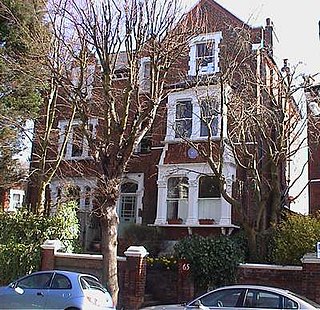
India House was a student residence that existed between 1905 and 1910 at Cromwell Avenue in Highgate, North London. With the patronage of lawyer Shyamji Krishna Varma, it was opened to promote nationalist views among Indian students in Britain. This institute used to grant scholarships to Indian youths for higher studies in England. The building rapidly became a hub for political activism, one of the most prominent for overseas revolutionary Indian nationalism. "India House" came to informally refer to the nationalist organisations that used the building at various times.
Dhandhuka was a Lok Sabha parliamentary constituency in Ahmedabad district of Gujarat, India. With the implementation of the delimitation of parliamentary constituencies in 2008, it ceased to exist.

The Travancore royal family was the ruling house of the Kingdom of Travancore. They had to give up their ruling rights in 1949 when Travancore merged with India and their political pension privileges were abolished in 1971. The family is descended from the Ay/Venad family and the Chera dynasty.
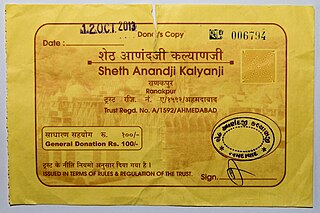
Anandji Kalyanji Trust is the largest and the oldest Jain trust, managed by lay Jains, with headquarters at Ahmedabad which manages more than 1200 Jain temples. The original charitable trust is said to have been founded somewhere in decades of 1630–40 AD and is running under name Anandji Kalyanji ni Pedhi or Anandji Kalyanji Trust since decade of 1720.

S. P. Varma is a social worker and peace activist from Jammu and Kashmir. He has been actively involved in peace-building efforts in conflict-ridden areas of the Kashmir valley.
Ratilal Chandaria (1922-2013) was an industrialist and philanthropist of Indian origin who resided in different parts of the world. He worked to modernize the Gujarati language.
Ravivarma Marthanda Varma was an Indian neurosurgeon, one of the pioneers of Indian neurosurgery and the founder director of the National Institute of Mental Health and Neurosciences (NIMHANS). He was the originator of a new surgical procedure for treating Parkinson's disease which later came to be known as Varma's Technique. He was a former Deputy Director General of Health Services, Government of India and an honorary surgeon to R. Venkataraman, former president of India. He was honoured by the Government of India in 1972 with Padma Shri, the fourth highest Indian civilian award.
Siddheshwar Varma (1887–1985) was an Indian linguist, phonetician, grammarian and scholar, known for his knowledge of over 30 languages. He was the secretary of the International Moral Education Congress for India (1923) and the author of such books as The Bhalesī dialect, A Glossary of the Khāsī : a north-western Himalayan dialect of Jammu and Kashmir, Siddha-Bhāratī; The rosary of Indology and Pahari dictionary of 27-north-western Himalayan dialects. The Government of India awarded him the third highest civilian honour of the Padma Bhushan, in 1957, for his contributions to literature and education.
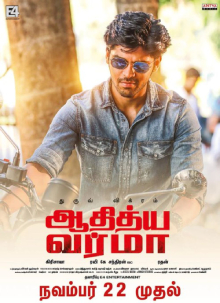
Adithya Varma is a 2019 Indian Tamil-language romantic drama film directed by Gireeshaaya in his directorial debut and produced by Mukesh Mehta under E4 Entertainment. The film stars Dhruv Vikram in his acting debut and Banita Sandhu in her Tamil debut, while Priya Anand appears in a supporting role. A remake of the Telugu film Arjun Reddy (2017) directed by Sandeep Reddy Vanga, it follows Dhruv Vikram, playing the titular character Adithya Varma, a high-functioning alcoholic surgeon who has anger management problems. He pushes himself to a self-destructive path after the marriage of his girlfriend Meera; following which, the film focuses on his downfall and subsequent resurgence.

Jishnu Dev Varma, is an Indian politician from Tripura. He is formerly served as 2nd Deputy Chief Minister of the Indian state of Tripura from 2018 to 2023. Jishnu Dev Varma was elected from the Charilam constituency in Tripura Legislative Assembly Assembly From 2018 till 2023. He is also President of Badminton Association of India.
Ratilal is a given name. Notable people with the name include:
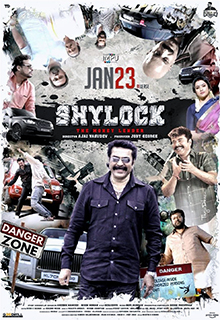
Shylock is a 2020 Indian Malayalam-language action thriller film directed by Ajay Vasudev. The film stars Mammootty in the title role and Rajkiran. Shylock is a slang term for a loan shark. The film is written by debutants Aneesh Hameed and Bibin Mohan and was released on 23 January 2020.
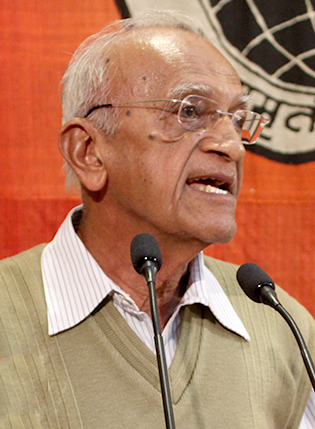
Ratilal Mohanlal Borisagar is a Gujarati humourist, essayist and editor from Gujarat, India. Born and educated in Savarkundla, he received a PhD in 1989. After working for some years as a teacher, he joined the state school textbook board until his retirement in 1998. He started his writing career as a story writer, but eventually gained acclaim as a humourist. He published several humour collections and humour novels, including the acclaimed book Enjoygraphy. He edited several works of children's literature and humour literature. In 2019, he received the Sahitya Akademi Award for his essay collection, Mojma Revu Re.















